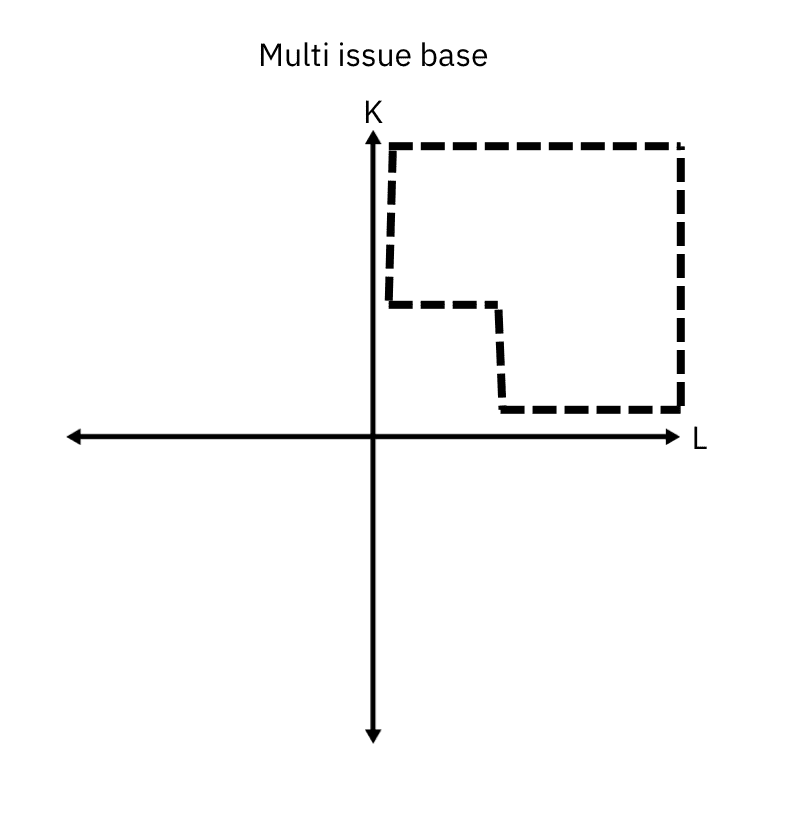Thoughts on single issue vs. multi issue positioning
By emre kaplan🔸 @ 2025-06-14T17:27 (+68)
This essay presents my thoughts on whether advocacy organizations should stay focused on a single issue and avoid commenting outside their focus areas. When you lead an advocacy organization, you frequently receive questions about your stance on other social issues. Some organizations pick a focus area like "animal advocacy" and never comment on anything outside that area. Other organizations publish comments on multiple issues, including current affairs, global politics, and the environment.
I don't attempt to cover all arguments or even the strongest arguments here. This is rather a list of considerations that weren't obvious to me from the start.
My overall tendencies on this question:
- Both single-issue and multi-issue positioning are legitimate options in some contexts.
- The effectiveness of creating a single-issue or multi-issue organization depends on the context, and we should let people experiment to organically see which approach performs better in each context. EA should be more open to supporting and creating multi-issue organizations.
- Multi-issue organizations should still be led by cooperative leaders. For example, leaders of a conservative animal welfare organization and a leftist animal advocacy organization should both be willing to cooperate with each other for common goals.
- The choice of multi-issue or single-issue positioning should be made from the start, and organizations should rarely change their issue positioning policy.
The rest of this post covers considerations for each side.
A general model for issue positioning
Here's a simple model for issue positioning. Assume there are two issues, K and L. K is the primary issue that we want to make progress on. Individuals in society are positioned according to how much they support K and L. For example, individual c is very pro-K and very pro-L.
When I started advocacy, I thought that by merely stating you are pro-K, you could unite all the pro-K people and form the greatest coalition. If you position as both pro-K and pro-L, then you lose anti-L people, ending up with fewer supporters and less impact.
I no longer think that's an accurate model. Let's examine three individuals in this model to explain problematic cases: a, b, and c.
For individual b, issue K is not salient enough. They won't feel motivated to contribute to a pro-K organization even if they agree with what it does.
It will also be difficult to attract both a and c simultaneously. They will conflict when they interact at social events or on social media. Since issue L is very salient to them, they will also be curious about the organization's take on L and demand solidarity. They will eventually be disappointed when they notice your silence after a trigger event on issue L. So you will miss out on "issue L extremists" when you don't position yourself on L.
For these reasons, I think a single-issue pro-K organization's natural supporter base is the following:
On the other hand, a multi-issue pro-K, pro-L organization will lose anti-L people. Instead, it will attract more pro-L people because of its pro-L positioning. So its supporter base will come from the area below:
Both single-issue and multi-issue organizations have comparative advantages with certain groups. Let's highlight these groups through areas A and B. The single-issue organization has an advantage in mobilizing people in area A compared to the multi-issue organization. The reverse is true for area B:
Depending on how society is distributed across issues K and L, the number of people in areas A and B might change. Here are a few rules of thumb about their relative sizes:
- If there is extreme polarization on issue L, B will be more crowded than A. In other words, if society is deeply split over an issue, nobody will support you unless you pick a side.
- If pro-K and pro-L attitudes are positively correlated, B will be more crowded. In other words, if animal advocacy people also tend to be environmentalists, you don't have much to lose from taking a position on both issues.
- If most people are already pro-L, B will be more crowded. In other words, there is not much to lose from saying that the Earth is round.
- If issue K has low salience, B will be more crowded. In other words, if people don't care much about your issue, getting them to respect you by proving your worth on their favorite issue has more benefits.
- If there is extreme polarization on K, A will be more crowded.
In general, the impact of issue positioning depends on the context. Our goal shouldn't be to create an organisation with the greatest support base but to maximise our counterfactual impact. In many cases, creating a new organisation that can attract a previously neglected small supporter base is more impactful since it broadens the supporter base for the cause.
Some Arguments for Single-Issue Positioning
Expertise Is Real
"We're eating dinner and this dude looks me dead in the eye and goes 'Celal Talabani just died, what happens now?' Like bro, do I look like the authority on this situation?"
—A Turkish tweet from Cihat Akbel
https://x.com/cihatakbel/status/281022071612522498
A major reason I don't want to comment on issues outside my focus area is that I don't feel sufficiently informed about them.
I feel comfortable sharing my opinions on animal advocacy because I have spent thousands of hours forming them. My opinions have changed many times over the years. Only a few of my beliefs have survived deliberation, and I currently feel more comfortable sharing those. But my beliefs on other issues haven't gone through a comparably thorough deliberation process.
When people ask me to comment on topics outside animal advocacy, my train of thought goes: "I'm so ashamed of certain things I said about animal advocacy back in 2018. Since I'm not more informed about this other cause, I will definitely make similar embarrassing mistakes if I comment. That will just ruin my track record and credibility, and all my well-considered opinions on animal advocacy will be met with suspicion."
The multi-issue advocate might respond, "What are you so unsure about? We just want you to stand against glaringly obvious injustices. Our issue is just a no-brainer."
I don't think so. In general, advocacy organizations ask for support when they are threatened and losing ground. When they are losing ground, it's not about the easy issues. No one asks you to tweet "All individuals have a right to dignity." The demands for help are mostly about the controversial edges of a cause because the edges are where wins and losses happen. It's never about making a general statement on fundamental human rights. You need to form an opinion about whether a specific individual has suffered injustice, who is the bad actor in some violent conflict somewhere in the world, or whether some specific large institution was right in instituting some specific policy. In general, you are asked to comment on something where society has been split around 50-50.
By commenting on everything, I don't want to end up like French intellectuals petitioning against age of consent laws. They thought it was their duty to comment promptly on a public issue where an individual was just going to be imprisoned. They chose the wrong side and should have thought harder and longer about the topic. For that reason, I want to keep my focus on areas where I'm confident that my expected impact is very high.
Limited Legitimacy
Sometimes platforms do not have enough legitimacy to comment on issues outside their focus areas. In particular, there is a problem with the following case:
You start as a platform focused on X. You have no position on Y.
Your supporters empower you to help you make progress on X.
Issue Y becomes more salient. After debating with your team, you make a statement on Y.
In many cases, doing this betrays the trust of your supporters. Some of your supporters might not have chosen to empower you if your positioning had been clear from the start.
There are legitimate ways to be a multi-issue platform. You can manage your supporters' expectations from the start by stating what type of organization you will be. Alternatively, you can incorporate supporter input into your decision-making. Through democratic mechanisms, you can get consent from your supporters for expanding to new focus areas. But I believe there is a legitimacy and trust problem in commenting on issues outside your focus area when such mechanisms are absent.
Adopting a Single-Issue Policy Provides a Principled Way to Stay Out of Other Issues
When people ask your views on some unrelated issue as an organization, "we don't talk about issues outside our focus area" is often a convenient answer. When you selectively take positions on some issues outside your focus areas, then you won't have this answer available. Your refusal to pick a position will more likely be interpreted as disagreement.
Some Arguments for Multi-Issue Positioning
Being Cooperative
Virtuous and cooperative agents avoid free-riding. While we are doing advocacy, we benefit from certain public goods that we haven't contributed to. For example, advocacy requires freedom of association, freedom of expression, due process, and other features of a liberal democracy. Benefiting from these public goods as a platform while not defending them is free-riding. Since cooperative agents should avoid free-riding, it seems we should pay back for these public goods in some way as organizations.
I'm not sure if the right way to pay back is always in the form of making statements and getting into further fights. Sometimes it might be in terms of "paying taxes"—offering financial support to the people building the infrastructure we depend on. For example, lately I'm thinking about paying for ads in the independent news outlets that cover corporate animal cruelty stories.
Smaller Movements Might Have More to Gain From a Norm of "We Must Fight Against All Injustices"
Animal advocacy is a small movement. In an environment where all advocacy organizations are forced to comment on all issues, people working on lower-salience issues have more to gain because their issue becomes more salient. Small animal advocacy organizations commenting on feminist priorities doesn't bring much value to feminism, but mainstream feminist organizations commenting on animal issues would greatly enhance the reach of animal advocacy.
So it seems to me that the largest and more established platforms should push for a norm of neutrality, whereas smaller movements should push for a norm of "you shouldn't stay silent against any injustice." Given that animal advocacy is a rather small movement, it seems it has more to gain from a norm of multi-issue positioning.
Single-Issue Platforms Might Be Unviable in Low-Trust Societies
Sometimes I read vegans complaining like the following:
"I just saw a vegan person supporting X Party (some extreme right political party). What the hell. I can't tell whom I can trust anymore."
Here's how I interpret these complaints:
"I needed veganism as a signal to identify people in my tribe so that I can easily cooperate with them. If 'bad people' start using the vegan signal, then I can't use it anymore to identify my potential friends. So I'm worse off when bad people start identifying as vegan."
In certain contexts, the main function of issue positioning is to build trust rather than trying to persuade anyone. People want to work with people similar to themselves. In low-trust societies where people are suspicious of each other and won't cooperate without extensive trust-building signals, single-issue platforms face more difficulty.
My impression in Turkey is that apart from a few interest groups that have concrete common financial interests, most prominent and powerful advocacy groups (religious communities, political parties, feminist advocacy groups, etc.) are rather multi-issue. Their primary product is often a lifestyle rather than progress on a specific issue. All of the largest NGOs at the very least signal their positioning on the secular/religious divide. Trying to avoid positioning on this issue seems to invite suspicion.
Here's a simple quantitative model to make this point clearer.
Let's assume that for every individual, you have a relationship score on a scale of -100 to 100. Every positive signal increases the relationship score. Someone will support your organization only if your relationship score with them is higher than 50. In higher-trust societies, there is an automatic +20 bonus you get with everyone. So you need fewer trust signals to reach 50. In lower-trust societies, you start from 0, so you need more trust signals to make your way to 50. As a result, single-issue platforms struggle more with passing the critical threshold with any person in low-trust societies. Meanwhile, multi-issue platforms can build more trust with a greater number of signals.
I'm curious about other observations from other low-trust countries. Please let me know whether there are powerful single-issue platforms in your country if you're living in a low-trust country.
Better to Be Multi-Issue by Choice Than Multi-Issue by Coercion
Sometimes a major event happens and both the overwhelming majority of society and the state have strong positioning over it. In these instances, they both pressure you to publish a statement on the issue. So far, I have tried to remain faithful to our neutrality policy when such events happened and avoided commenting on issues outside animal advocacy.
But I fear that trying to practice this policy might be even more costly in the future when tested against more difficult times. I don't want to commit to a policy that I will end up breaking through coercion in the future. I don't want to signal that I reward agents that pressure me, so it might just be better to not have a single-issue policy from the start.
Vasco Grilo🔸 @ 2025-06-16T19:18 (+6)
Thanks for sharing, Emre!
I liked your conceptual analysis. On the other hand, I would say the empirical evidence points towards single-issue organisations being more cost-effective. I think the organisations supported by impact-focussed evaluators and funders like Animal Charity Evaluators, EA Funds, GiveWell, and Open Philanthropy are overwhelmingly single-issue.
I worry multi-issue advocacy by animal welfare organisations may easily backfire:
- An environmentalist or health-centric stance can lead to the replacement of beef and pork with poultry meat, eggs, fish, and other seafood, which I think is bad both for farmed and wild animals.
- Arguments based on animal-rights (instead of animal welfare) can encourage wilderness preservation, which I believe is harmful due to wild animals having negative lives.
Alejandro Ruiz @ 2025-06-22T12:38 (+3)
To me, this piece reads as advocacy for multi-issue positioning, despite the initial framing. Both the amount of arguing for one side and the positioning makes me think so.
Your analysis seems to me to be very susceptible to the amount of salience a certain matter may have on both axis. Or said another way. Supposing you're weighting your chances by the area of your graphics, I think you may have drawn them too close to origin of coordinates, specially the multi-issue one. Suppose that, on your multi-issue graphic, people who care bout L won't support you unless your position on L is at least 50% of the way to the current extreme. Or else, suppose there is a "top right" quadrant where you can't really make progress, because if you take your positions on the L issue to the extreme, you'll lose the support on only of the anti-L, but also of the moderate-on-L. That is, you've drawn a coordinates system but at the same time you've assumed a binary of positions, only L or not-L. Thus, by amount of area, it may very well be that A is, in reality, bigger than B.
Complicating things further, much of the time there is not a single-issue L you have to care about, but a memeplex of which L is just a part, and by taking a position on L, not only you're committing yourself to having a position on all of the memeplex, but you're assumed by default of having such a position, unless you actively communicate against that (risking to antagonize your pro-L supporters). With this in mind, your point of "Adopting a Single-Issue Policy Provides a Principled Way to Stay Out of Other Issues" becomes extremely important.
In summary, I fear that, for a slightly more complicated framing of the question, the single-issue becomes simpler and easier to defend, and thus better.
Karen Singleton @ 2025-07-09T03:28 (+2)
Thank you for this post, it articulates a tension I’ve felt for some time volunteering within a single-issue political party(animal focused). I found the section on limited legitimacy and the risks of shifting positioning without supporter consent particularly resonant, that trust is hard-won and easy to lose.
At present, we’ve tended to respond with “we only focus on X,” but as we mature as a party, I’m hopeful we’ll increasingly draw on our core values (which include compassion and nonviolence) to guide which issues we engage with and how. Our circle of compassion is already wide, even as an animal-focused party, from ecosystems to poverty to food systems, so there’s a natural (and values-aligned) path to grow into that broader voice. I hope, as we do, our supporters will recognise the same values that drew them in and walk with us.
SummaryBot @ 2025-06-16T15:40 (+1)
Executive summary: This exploratory post outlines the author's evolving views on whether advocacy organizations should adopt single-issue or multi-issue positioning, arguing that both strategies are valid depending on context, but that multi-issue positioning deserves greater support within Effective Altruism and may be strategically preferable for smaller movements. Key points:
- Single- vs. Multi-Issue Framing Should Be Chosen Early and Rarely Changed: The author argues that organizations should commit to their positioning strategy from the outset to maintain supporter trust and legitimacy, and not shift stance opportunistically.
- Supporter Dynamics Vary by Positioning Strategy: A simple model shows that while single-issue organizations avoid alienating potential allies, they may struggle to attract people who expect solidarity across causes; conversely, multi-issue organizations can reach broader but more ideologically narrow audiences, especially when issues are correlated or highly salient.
- Expertise and Legitimacy Favor Caution in Commenting: The author expresses reluctance to speak on issues outside their domain, citing a lack of deep understanding, fear of reputational risk, and concerns about betraying the trust of supporters who aligned with the organization’s original scope.
- Multi-Issue Advocacy Can Be More Cooperative and Strategic: Defending public goods like freedom of expression, reciprocating support between movements, and aligning with expectations in low-trust societies may justify multi-issue engagement—particularly for smaller movements that benefit from heightened visibility.
- Context Matters Deeply: The author emphasizes that issue salience, political polarization, and societal trust norms all affect whether single-issue or multi-issue strategies will maximize counterfactual impact—suggesting experimentation and local adaptation over dogma.
- Coercive Pressures May Undermine Neutrality Policies: Rather than risk breaking neutrality under pressure during controversial moments, the author suggests it may be wiser for some organizations to adopt multi-issue positioning proactively and transparently.
This comment was auto-generated by the EA Forum Team. Feel free to point out issues with this summary by replying to the comment, and contact us if you have feedback.



